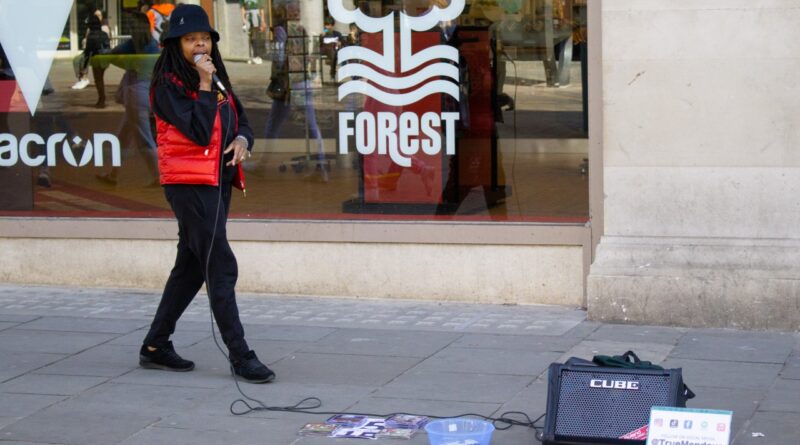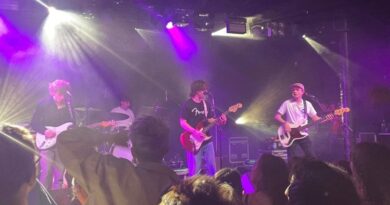The lives of Nottingham buskers
The lives of Nottingham buskers
Nottingham is one of the most vibrant cities in the UK, from its tales of Robin Hood to the rich architecture, the music scene in Nottingham boasts many talented buskers can make for a lively evening.
Several Nottingham buskers shared their stories and passion for music, they also provided a glance into what makes busking different to performing live and their approach to their music.
Steve Clegg, 37, is a guitarist who started busking to ease some financial struggles he was facing and to deal with the sadness of leaving his family behind.
His parents were musicians, so he found himself surrounded by music since a young age, taking part in his first karaoke at the age of 14.
After temporarily losing touch with his musical side, he decided to pick his guitar back up during a rough patch in his relationship with his wife.
Following his friend’s advice to not just stick with the basics he was used to but to become more advanced, he gradually learned to play tougher songs; he then started writing his own lyrics and composing songs.
He tries to pick songs that he personally likes while busking and tries to bring out a good combination of old and new music. He says: “when you go on the streets, there is an audience formed of every age, from kids to pensioners.”
Steve made sure to add that he “found the music community in Nottingham very welcoming despite the fact that he had a lot to learn and that he felt encouraged to come back which gave him confidence.”
He also enjoys collaborating with other buskers as he believes it brings “flavour” to his music; for Steve music is an expression of himself and represents how he is feeling at the time he performs.

Steve said: “Music is like a living being, it can touch your soul, it can make you laugh, make you cry even make you fall in love as well and that’s what keeps me into music as it can do so much.
He added: “The purpose of music should be to spread love and kindness. Music can put the smile back on my face. When someone writes something, they are sharing a piece of themselves, even if they are shattered at the moment. The most beautiful songs are ones written by broken souls.”
Steve does a lot of cover songs ranging from pop, classic, to rock songs and shares them on his YouTube channel (Steggy Music – YouTube), trying to add a unique spin on the songs to make it different to the original.
Obi Rudo, 30, was in Preston nine years ago when he ran across a busker who explained his experience of rapping on the streets to him. He talked about how he has the option to travel, meet new people and perform; this conversation stayed with him.
Obi started writing at school, before he went to the Community Recording Studio in St Ann’s. The CRS is a charity set up in the 90s with the aim of giving young people access to professional equipment as well as industry contacts. He soon started busking, initially in Birmingham.
He said: “I stood outside for hours in the cold, but this didn’t dissuade him.”
Eventually he started busking more and more regularly, even going to many European countries to busk. Obi adds: “I never learned to busk, I got into it straight away; there are not many rappers who busk.”
He explains that busking is raw, it is like a performance for a very critical arena; when people come to a pre-planned venue, they are unlikely to get confrontational – on the streets, says Obi, they will give their opinions right to your face.
Obi grew up in the Congo, so he has always been heavily into rhythm and dancing, he started rhyming, using commonly known buzz words to develop a flow and believes his skill was strengthened by his African upbringing. He said: “With fast music, often no one notices the lyrics” – he was inspired by the rapper Carey James whose rapping and lyrics were deeply meaningful; he sets the intention of his song in the chorus and follows it through.
“There have been times that people have cried because they connected with my lyrics, and they often sit around for hours to listen. I believe in the words of Will Smith that hard work defeats talent.”

For Obi, practice is very important to busking – every performance is another round of practice.
“It’s very important to people that the artist is enjoying themselves. People will enjoy it automatically, then. I get inspired by a lot of artists, but I try to avoid taking too much from them as it helps me to be authentic.”
He says when he did his first CD, it contained 20 songs, and he avoided explicit language completely. As he grew, he changed as a person and it reflected in his music.
“I believe art shouldn’t be caged. It should be wild and hyper expressive, the rawer it is, the more people will enjoy it. I assess myself a lot and that reflects in my music as well.”
He says that though he doesn’t like compliments seeing people’s expressions in response to his art makes him happy.
For Obi music is a therapy, like an organ that he needs to live.
By Anmol Agrawal
Feature Image: Meg Atkinson
Image credits: Anmol Agrawal




